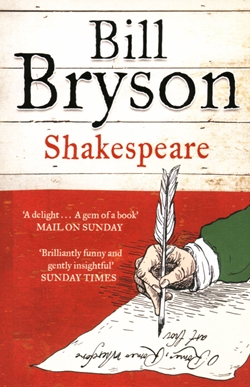I have never been a particular fan of William Shakespeare, having been forced to learn lines from The Merchant of Venice at the point of a cane many years ago. However, I have always been a fan of Bill Bryson, and when I saw Shakespeare by Bill Bryson on the Bookazine shelves, I had to take it home. Would someone with Bryson’s consummate writing skills overpower my boyhood prejudices?
This biography, centuries after the playwright died, simply entitled Shakespeare (ISBN 978-0-00-719790-3, Harper’s Press, 2009) is yet another example of Bryson’s genius, let alone the reported genius of this Shakespeare fellow.

Bryson begins by showing us that nobody really ‘knew’ Shakespeare, let alone the bard of Stratford Upon Avon himself. A man who spelled his own name in several different ways, was he perhaps more than one? Bryson observes that “Shakespeare it seems is not so much a historical figure, as an academic obsession.”
The author admits that “this book was written, not because the world needs another book on Shakespeare, as because this series does. The idea is a simple one: to see how much of Shakespeare we can know, really know, from the record. Which is one reason of course, it is so slender.” (And at 200 pages, including the bibliography, it is indeed slender.)
Bryson spends much time describing things we do know something about, especially the lives of the common man in the late 1500’s. Plague or pestilence was a real threat, and longevity was not the norm. Typhus and leprosy were commonplace, and there were no antibiotics, so even simple infections could carry one off. TB, rickets, measles, scurvy and smallpox abounded. We do not realize how fortunate we are today.
Life for the average Londoner was also very different from their lives today. The Southwark end of London Bridge had poles where the heads of criminals were displayed. There were so many of these that a “Keeper of the Heads” had to be employed. A grisly job that must have been.
The sights and smells are recorded by Bryson with such edifying items as the leather tanners who steeped their products in vats of dog feces to make the leather more supple. “No one reached a playhouse without encountering a good deal of odor.”
However, only when it is pointed out that Shakespeare introduced 2,035 new words to the English language, most of which are in common usage today, that you see what a towering literary giant he really was. Consider these, “antipathy, critical, frugal, dwindle, extract, horrid, vast hereditary, excellent, eventful, barefaced, assassination, lonely, leapfrog, indistinguishable, well-read and zany” just for starters.
This book does give the reader an insightful view of Shakespeare and the times. At B. 485, this book deserves to sit beside Shakespeare’s sonnets. Another example of how a mature writer can unearth facts, and present them in a readable and amusing fashion. A truly enjoyable book, but heed Bryson’s final sentence, “Only one man had the circumstances and gifts to give us such incomparable works, and William Shakespeare of Stratford was unquestionable that man – whoever he was.”




